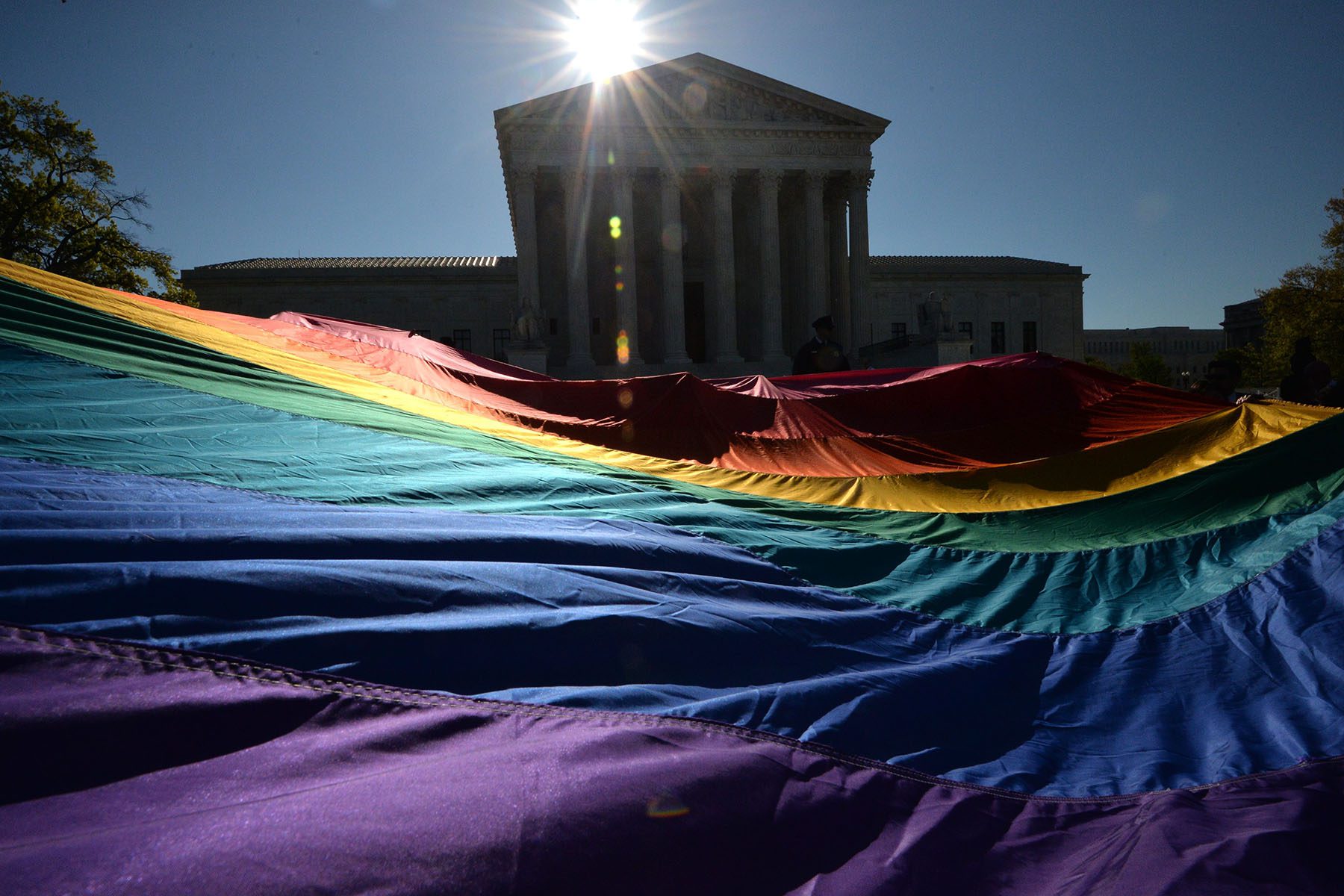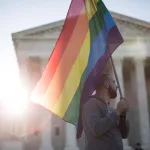The Supreme Court’s draft opinion leak has James Esseks worried, and not just about abortion access. Esseks, the director of the LGBTQ & HIV Project at the ACLU, ticks off the civil rights laws he fears could be on the chopping block.
“This potential majority of five justices seems perfectly willing to jettison 50 years of precedent and a right that has become deeply ingrained in the fabric of American society based on not a whole lot,” he said.
Since it leaked Monday, legal experts across the nation have dug through Justice Samuel Alito’s draft opinion that would overturn Roe v. Wade, the 1973 decision that granted the right to an abortion. Some LGBTQ+ experts say the draft opinion leaves critical civil rights law vulnerable, including cases that granted Americans the right to same-sex relationships (Lawrence v. Texas) and marriage equality (Obergefell v. Hodges). The draft opinion also signals that the court is willing to disturb significant legal precedent — which could have consequences beyond immediately restricting abortion access, said Ezra Ishmael Young, who teaches constitutional law at Cornell Law School.
“I think the concern with LGBTQ+ people is if they’re willing to do it in abortion, are there any other issues where they’re willing to do it too?”
Still, the long-term consequences are unknown, Young said, especially since the draft opinion is from February and details of the current opinion are not public. (Chief Justice John Roberts has confirmed the authenticity of the document but stressed that it is not the final opinion of the court.)
LGBTQ+ advocates have long nervously eyed the increasingly conservative court. In October 2020, Justices Clarence Thomas and Samuel Alito indicated that they believed that marriage equality should be overturned. When the court declined to hear the appeal of Kim Davis, a former Kentucky clerk who turned away a same-sex couple seeking a marriage license, the two justices hinted that marriage equality was wrongly decided and should have been left to states, leaving many believing that the court would overturn marriage equality if given the chance.
“Obergefell enables courts and governments to brand religious adherents who believe that marriage is between one man and one woman as bigots, making their religious liberty concerns that much easier to dismiss,” Thomas wrote.
Legal experts are concerned about the potential impacts of language in the draft opinion and its intersection with the 14th Amendment, which granted Americans equal protection under the law. Decisions in cases including Lawrence, Obergefell and Griswold v. Connecticut — which established a right to access contraception — relied on a right to privacy typically defended by the 14th Amendment’s right to due process.
But in the draft, Alito argues that right is not explicitly mentioned in the Constitution. Privacy is not mentioned in the Constitution, but the court has previously ruled that the right to due process covers rights otherwise not expressly covered. Alito’s writing indicates those cases could be called into question, said Anthony Michael Kreis, who teaches constitutional law and employment discrimination at the Georgia State University College of Law.
“The danger of overturning Roe is in the fact that you’re tipping a major leg of the right-to-privacy stool out from underneath it,” he said. “If you take that critical component piece out, then it opens all these other things up to a greater degree of susceptibility.”
Right to privacy also plays a huge role in the legality of bans on gender-affirming care for trans youth. If Alito’s draft opinion language on privacy is preserved and a lawsuit ever reached the high court, Kreis is worried that rights to bodily autonomy and personal health care decision-making would again be threatened.
“I think there’s an imminent danger to trans rights in a post-Roe world,” he said.
President Joe Biden, speaking to reporters Wednesday, raised similar concern that the draft opinion in its current form would curtail LGBTQ+ rights.
“This is about a lot more than abortion,” he said. “What happens if you have states change the law saying that children who are LGBTQ can’t be in classrooms with other children? Is that legit, under the way the decision is written? What are the next things that are going to be attacked?”
Esseks also brought up the vulnerability of Loving v. Virginia, which found that laws banning interracial marriages violated the 14th Amendment.
“They talk about it as the right to marry a person of a different race,” Esseks said, clarifying that each ruling granted marriage rights for protected classes but none guaranteed marriage outright. “So it’s not a broad right. It’s a very specific right.”
That distinction really matters in civil rights law, said Esseks. The justices who dissented in the Obergefell case on same-sex marriage “would have said there may be a right to marry, but it doesn’t cover same sex relationships.”
Esseks fears Alito’s decision would set a precedent and would not guarantee the right to marry between people of different races, people of the same sex or for a person behind bars.
While the draft opinion states that other civil rights laws — including cases such as Lawrence and Obergefell — are untouched by the decision, attorneys for advocacy organizations say that if the language is final, it opens a Pandora’s box for rolling back some of the most fundamental American rights guaranteed in the 14th Amendment.
“Roe is based on this idea of substantive due process,” said Alejandra Caraballo, a clinical instructor at the Cyber Law Clinic at Harvard Law School. “Basically all of the LGBTQ rights cases are built on this idea of equal protection and substantive due process.”
The federal government argued in a friend of the court brief last year — regarding the same Mississippi law restricting abortion access that is central to Monday’s leaked draft opinion — that accepting limits to what liberties are protected by the 14th Amendment would threaten Americans’ rights to same-sex intimacy and marriage.
The court’s leaked draft opinion to overturn Roe pokes holes in what protections are offered by the 14th Amendment’s due process and equal protection clauses by stating that such rights must be “deeply rooted” in the country’s history.
“It opens up a can of worms related to legal arguments regarding the 14th Amendment and its application to the 14th amendment,” said Victoria Kirby York, deputy executive director of the National Black Justice Coalition. “It is the constitutional amendment that reset in many ways a lot of the anti-Black, anti woman messages in the original Constitution.”
LGBTQ+ advocates did not mince words Tuesday.
“This is a fight for our lives,” said Sharon McGowan, legal director of Lambda Legal. “From the minute Obergefell was decided, from the minute Lawrence was decided, we knew that there were folks who would never accept that as the final word. We are living in that moment in a very intense way right now.”
Toward the end of the draft court opinion, Alito acknowledges that the court cannot predict what political or societal consequences would arise from overturning Roe.
“And even if we could foresee what will happen, we would have no authority to let that knowledge influence our decision,” he writes.






